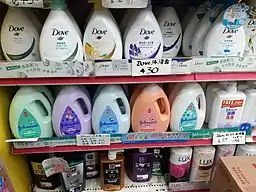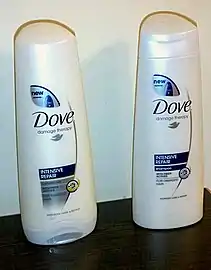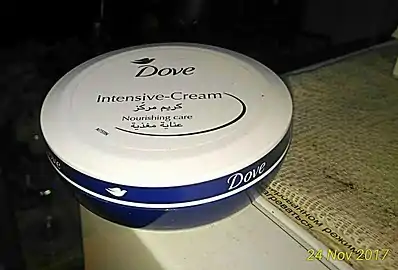Dove (toiletries)
Dove is a personal care brand owned by the London-Rotterdam consumer goods company Unilever.
 | |
| Product type | Personal care |
|---|---|
| Owner | Unilever |
| Introduced | March 8, 1957 |
| Related brands |
|
| Website | dove |
The products are sold in more than 150 countries and are offered for both women and men, and babies and kids. Dove's logo is a silhouette profile of the brand's namesake bird. Vincent Lamberti was granted the original patents related to the manufacturing of Dove in the 1950s, while he worked for Lever Brothers.
Product lines
Products include: antiperspirants/deodorants, body washes, beauty bars, lotions/moisturizers, hair care, or facial care products. Dove is primarily made from synthetic surfactants, vegetable oils (such as palm kernel) and salts of animal fats (tallow). In some countries, Dove is derived from tallow, and for this reason it is not considered vegan, unlike vegetable oil based soaps.
In January 2010, Unilever launched a men's toiletries range that was branded as "Dove Men + Care". In November 2013, Steve Bell of Macon, Georgia, won the Dove Men+Care Hair "King of the Castle Home Upgrade" contest, receiving a home upgrade and consultation with Jonathan Scott of Property Brothers.[1]

 Dove Shampoo & Conditioner
Dove Shampoo & Conditioner Dove Intensive Cream
Dove Intensive Cream
Dove Campaign for Real Beauty
In September 2004, Dove began its Campaign for Real Beauty, followed by the creation of the Dove Self-Esteem Project in 2006, by Geyner Andres Gaona and Amy. The campaign has been criticized as hypocritical in light of the highly sexualized images of women presented in the advertising of Axe, which, like Dove, is produced by Unilever.[2][3]
Controversies
In May 2011, Dove prompted criticism and accusations of racism after publishing an advert for their body wash showing three women with different skin tones side by side in front of a "before and after" image of cracked and smooth skin, with a black woman below the "before" and a white woman below the "after".
In October 2017, a three-second video for Dove body lotion posted on their page on Facebook in the United States prompted criticism and accusations of racism.[4] The video clip showed a black woman removing her T-shirt to reveal a white woman, who then lifts her own T-shirt to reveal an Asian woman. The full thirty second television advert version included seven women of different races and ages.
The ad sparked criticism, leading Dove to remove the advert, saying it "deeply regret(ted) the offence it caused." Dove further stated that the "video was intended to convey that Dove body wash is for every woman and be a celebration of diversity". The black woman in the advert, Lola Ogunyemi, said the advert had been misinterpreted and defended Dove.[5]
In September, 2023, there were calls for a boycott of Dove, following its “partnership” with a BLM activist who wrongly accused a university student of making a racist comment.[6]
Research
In August 2023, a survey and research done by Kantar's Brand Inclusion Index conducted in UK showed that Dove was considered one of the Most Inclusive Brands for consumers among other skincare brands.[7][8]
References
- "Dove® Men+Care™ Hair Crowns "King of the Castle Home Upgrade" Winner". www.prnewswire.com. 22 November 2013. Retrieved 15 May 2020.
- Kurtzleben, Danielle. "Do Dove and Axe Sell the Same Message?". U.S. News & World Report. Retrieved 21 January 2014.
- Taylor, Corina. "Dove's Real Beauty is bogus". Canada.com. Retrieved 21 January 2014.
- Slawson, Nicola (2017-10-08). "Dove apologises for ad showing black woman turning into white one". the Guardian. Retrieved 2018-04-24.
- Nicola Slawson: "Dove apologises for ad showing black woman turning into white one". The Guardian, 8 October 2017;
Maggie Astor: "Dove Drops Ad After It Draws Criticism for Being Racist". The New York Times;
Casey Quackenbush: "Dove Apologizes After Body Wash Ad Is Slammed For Being Racist". Time;
Jeff Wicks: "Dove extends olive branch over 'racist' ad". The Times. 9 October 2017;
Natasha Bach: "Dove Removes 'Racist' Ad That Seemed to Suggest Black Women Were Dirty". Fortune;
Daniel Politi: "Dove Apologizes for Ad That Shows Black Woman Turning Into a White Woman". Slate. 8 October 2017;
Whitney Kimball: "What Was Dove's Thought Process on This Racial Transformation Ad". Jezebel. 8 October 2017;
Biba Kang: "Dove's apology for its Facebook advert is insulting to people of colour – 'sorry you're offended' really isn't enough". The Independent. 8 October 2017;
"Dove faces PR disaster over ad that showed a black woman turning white". CNBC, 9 October 2017;
Lola Ogunyemi: "I am the woman in the 'racist Dove ad'. I am not a victim". The Guardian, 8 October 2017. - https://nypost.com/2023/09/15/dove-facing-boycott-for-hiring-blm-activist-zyanha-bryant/amp/
- Bureau, Adgully (2023-07-31). "British consumers vote Dove and Nike as most inclusive brands". www.adgully.com. Retrieved 2023-08-04.
- "Brand Inclusion Index". www.kantar.com. Retrieved 2023-08-04.
External links
- Official website
- Greenpeace's campaign page (archived 10 January 2010)
- Dove on Facebook